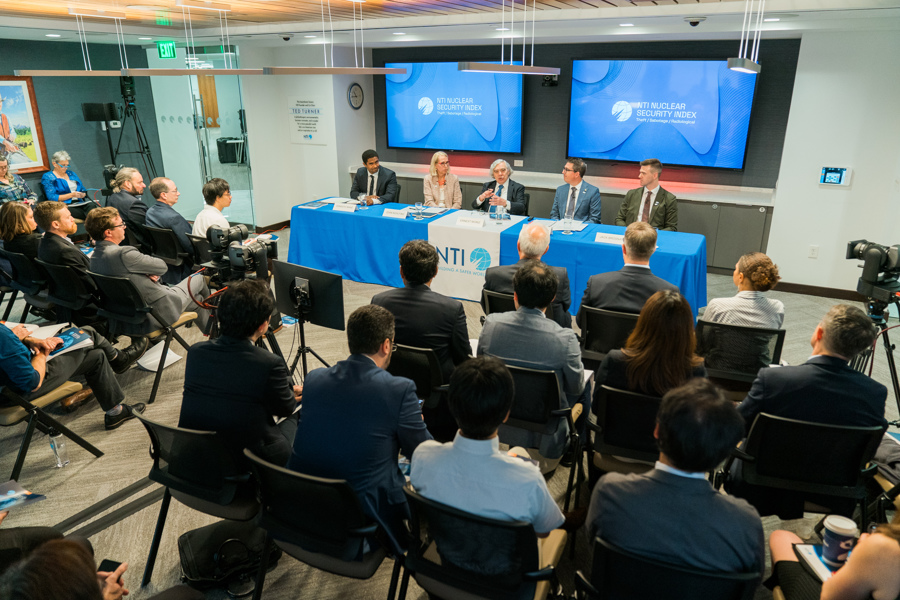
Sam Nunn
Co-Founder and Co-Chair, NTI
New Reports Call for G8 Summit Action on WMD Security;
Deadly Threats Remain Worldwide, Despite Progress in Russia
With terrorists actively seeking nuclear weapons and the materials to make them, urgent measures are needed to prevent a nuclear 9/11, according to two new reports released today on the eve of the G8 summit in St. Petersburg. The reports, Securing the Bomb 2006 by Matthew Bunn and Anthony Wier of Harvard’s Managing the Atom Project, and Assessing the G8 Global Partnership: From Kananaskis to St. Petersburg by the Strengthening the Global Partnership Project, were commissioned by the Nuclear Threat Initiative (NTI).
Securing the Bomb 2006
Security and accounting upgrades are accelerating in Russia, but dangerous threats of nuclear theft remain, in Russia and worldwide, according to the Securing the Bomb report. The study notes that Russia’s Minister of Interior recently confirmed that “international terrorists” were planning attacks to “seize nuclear materials and use them to build weapons of mass destruction,” and that in April 2006, a group of conspirators was arrested with 22 kilograms of low-enriched uranium stolen from Elektrostal – a plant that also processes tons of weapons-usable highly enriched uranium (HEU), where multiple thefts have occurred before.
Far less progress has been made elsewhere in the world, with the materials needed to make nuclear weapons spread out in more than 40 countries, some with little more security than a night watchman and a chain-link fence. With no binding global security standards and no comprehensive plan for ensuring that all nuclear warheads and caches of weapons-usable material around the world are secure and accounted for, there remains “an unacceptable danger that terrorists might succeed in their quest to get and use a nuclear bomb, turning a modern city into a smoking ruin.”
“There are still major gaps in our efforts to keep the essential ingredients of nuclear weapons out of terrorist hands,” said report co-author Matthew Bunn. “These gaps need to be closed. As President Bush has said, we need to do ‘everything in our power’ to make sure terrorists never get the bomb — but neither the United States nor other countries are even close to meeting that standard."
The report commends the hundreds of experts and officials from the United States, Russia and other countries who have worked hard and often creatively to achieve progress in securing nuclear warheads and materials and says that “the most fundamental missing ingredient of the U.S. and global response to the nuclear terrorism threat to date is sustained high-level leadership.”
“Our leaders are using the right words, but they are not making this threat the top priority it needs to be, and the G8 Summit is an opportunity to fix that,” said former Senator Sam Nunn, co-chairman of NTI. “We know when a President makes a security issue a real priority – it is at the top of the agenda in every meeting with world leaders; it is the focus of his public remarks; his Cabinet and staff put it at the top of their agendas. Presidential priorities become budgetary priorities. There should be no higher security priority for our nation and the world than keeping nuclear weapons and materials out of the hands of terrorists.”
Good News. The report illustrates that the gap between the threat and the response has narrowed in recent years, with actions such as the accord on nuclear security between Presidents Bush and Putin at their 2005 summit in Slovakia and the launch of the Global Threat Reduction Initiative (GTRI) in 2004. As a result, progress locking down nuclear weapons and materials has accelerated. At of the end of FY05, U.S.-funded comprehensive security and accounting updates had been completed for 54 percent of the buildings in the former Soviet Union with potentially vulnerable weapons-usable nuclear material; rapid upgrades had been completed for 64 percent of the buildings. Nearly 50 percent of the materials in Russia had received cooperative comprehensive or rapid security upgrades. GTRI has accelerated the pace of removing nuclear material from vulnerable sites. The report calls this work an “excellent investment in U.S. and world security,” but says that in virtually every category of effort, there is much more to be done.
Global Challenge. The report emphasizes that wide gaps remain in efforts to secure nuclear stockpiles in the rest of the world and warns that, even in Russia, there are still major questions about whether the security measures being put in place are sufficient to meet the threat and will be sustained after U.S. assistance phases out. A recent Department of Energy study concluded that there are 128 nuclear research reactors or associated facilities around the world with enough highly enriched uranium to potentially make a bomb – a larger number of facilities than had been previously publicly recognized. The report states that “neither the U.S. government nor any other government or organization around the world has a complete picture of all the factors involved in prioritizing where the most urgent threats of nuclear theft lie.”
The Global Threat Reduction Initiative has major gaps with two-thirds of the U.S.-supplied highly enriched uranium abroad not yet covered by the U.S. take-back offer and nearly half of the HEU-fueled research reactors not yet targeted for conversion to safer fuels.
“Unsecured nuclear material doesn't have to be stamped ‘Made in Russia’ to be used in a terrorist nuclear attack,” said report co-author Anthony Wier. “Every stockpile of potential bomb material, in every country around the world, must be secured against the threats terrorists have demonstrated they can pose, not just the materials within a particular program’s self-defined stovepipe.”
Recommendations. The report calls for world leaders to launch a fast-paced global coalition against nuclear terrorism, focused on locking down all stockpiles of nuclear weapons and weapons-usable nuclear materials worldwide as rapidly as possible. “The G8 summit in St. Petersburg will represent another opportunity to launch a fast-paced global effort to secure nuclear stockpiles,” which “should not be missed,” the report concludes. The report also calls for President Bush and other leaders of major nuclear weapons and nuclear energy states to immediately seek agreement on a broad political commitment to meet a common minimum standard of nuclear security, and calls for an “accelerated and expanded global cleanout” effort to remove nuclear material entirely from the world’s most vulnerable sites within four years. The report outlines concrete steps to convince nations around the world of the urgency of the threat; to build genuine nuclear security partnerships; and to cooperate on securing stockpiles without compromising nuclear secrets. The most fundamental requirement of success, the study argues, is sustained high-level leadership; hence “President Bush should appoint a senior full-time White House official, with the access needed to walk in and ask for presidential action when needed, to lead these efforts, and keep them on the front burner at the White House every day.”
Assessing the G8 Global Partnership: From Kananaskis to St. Petersburg
This report by the Center for Strategic and International Studies examines the progress made to date by the G8 Global Partnership Against the Spread of Weapons and Materials of Mass Destruction in securing and reducing the WMD complex, weapons, and materials in Russia and elsewhere. At the 2002 G8 Summit in Kananaskis, Canada, world leaders announced their commitment of $20 billion over 10 years to be dedicated to preventing catastrophic terrorism and the proliferation of weapons of mass destruction.
Four years later, the G8 Partnership countries have pledged approximately $17.5 billion to this work, but it has not received the sustained attention and effort needed to reduce these dangers. According to the report, the Partnership “has not yet reached its financial goal of $20 billion in pledges, and so far, only a small portion of pledges have been turned into projects.” Resources should be dedicated to completing work in the former Soviet Union while at the same time countries should begin addressing urgent nuclear, biological and chemical security vulnerabilities in the rest of the world.
The report assesses that while the G8 leaders have given important rhetorical priority to the work of securing WMD stocks, progress to date does not yet reflect the necessary urgency of the threat of WMD terrorism. The report gives recommendations for how the Global Partnership countries can move more quickly to ensure that funds are reducing the most urgent threats of securing nuclear and biological materials.
The report also recommends how Russia’s leadership as president of the G8 in 2006 can be a catalyst for this global effort. “As G8 President, Russia has a unique opportunity to demonstrate its leading role in preventing catastrophic terrorism by reinvigorating the Global Partnership, focusing its work priorities on the most vulnerable materials, and rallying the rest of the G8 to work together to secure or remove all WMD-useable material around the globe,” said Robert Einhorn, Senior Adviser at the Center for Strategic and International Studies (CSIS) and former Assistant Secretary of State for Nonproliferation.
About the Projects
The fifth in an annual series prepared by Harvard’s Managing the Atom project and commissioned by NTI, “Securing the Bomb 2006” and its online companion at www.nti.org/about/projects/Securing-bomb/ provide the most detailed assessment of global nuclear threat reduction programs to date, both in terms of work completed and dollars spent, along with comprehensive recommendations for action. The website features in-depth program-by-program assessments and recommendations and an interactive budget database including the budgets for each U.S. nuclear threat reduction program from 1992 to the present.
The Strengthening the Global Partnership project is a CSIS-led consortium of 24 research institutes in 19 European, Asian, and North American countries working to build political and financial support for G8 efforts to reduce the dangers from nuclear, biological and chemical weapons, beginning in the former Soviet Union. The project’s ultimate goal is to ensure sustained financial support for and effective implementation of the G8 Global Partnership.
###
Sign up for our newsletter to get the latest on nuclear and biological threats.
According to a report, new steps are urgently needed to broaden and accelerate work to keep nuclear weapons and the materials needed to make them out of terrorist hands.
“The bottom line is that the countries and areas with the greatest responsibility for protecting the world from a catastrophic act of nuclear terrorism are derelict in their duty,” the 2023 NTI Index reports.
NTI welcomes the G-7 leaders’ statement as they meet in the city where a nuclear weapon was used in war 78 years ago.

